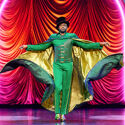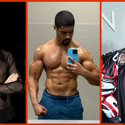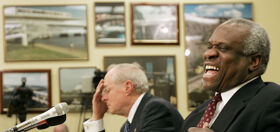
Who else feels bad for Scott Lively (pictured), Caleb Lee Brundidge, and Don Schmierer? We sure do! After all, these three American men traveled to Uganda with the noble purpose of spreading the anti-gay gospel, and all they got was a lousy reputation of instigating the country’s Anti-Homosexuality Bill. Schmierer, a board member at Exodus International, which advocates conversion therapy says he’s been “duped” by Uganda’s faith-based power players, who, though no fault of these Americans, took their homophobic messages and turned them into a push to to legally execute gays. But don’t bother with the New York Times archaically late news report about these three men who are now on the defensive, claiming their good intentions have been misappropriated in a foreign land.

Because Kapya Kaoma, an Anglican priest for Zambia, and author of the Political Research Associates’ October report “Globalizing the Culture Wars: U.S. Conservatives, African Churches and Homophobia,” has a much more concrete analysis about how these American hate leaders helped lead Uganda’s own gay witch hunt. And how, really, Uganda’s situation isn’t all that unique.
If they had faced strong opposition, U.S. conservatives might not have been so successful in promoting their homophobic politics. Traditionally, evangelical African churches have been biblically and doctrinally orthodox but socially progressive on such issues as national liberation and poverty, making them natural partners of the politically liberal western churches. But their religious orthodoxy also provides the U.S. Right with an opportunity. Africans resonate with the denunciation of homosexuality as a postcolonial plot; their homophobia is as much an expression of resistance to the West as it is a statement about human sexuality. Similarly campaigns for “family values” in Africa rest on rich indigenous notions of the importance of family and procreation. In Africa, “family” expresses the idea that to be human is to be embedded in community, a concept called ubuntu. African traditional values also value procreation, making those hindering this virtue an enemy of life (see box 2).
Although Rick Warren’s involvement in Africa is the most celebrated, and Lively’s perhaps the most notorious, they are not the first U.S. conservative evangelicals to influence African policies. Pat Robertson’s television show The 700 Club is watched across sub-Saharan Africa. Yet most Africans are not aware that Robertson supported the civil war in Angola and the oppressive White governments of Rhodesia (now Zimbabwe) and South Africa. He was one of many U.S. conservative evangelicals, some of whom came to Africa as missionaries in the 1980s, who sided with those White minority governments in their effort to stop the spread of liberation theology. Allied with them was – and is – the Institute on Religion and Democracy (IRD), a U.S. neoconservative group that also supported the White regimes and challenged the National Council of Churches as a group of dangerous Marxists supporting subversion. The group formed in 1981 with the goal of weakening and splitting U.S. mainline denominations in order to block their powerful progressive social witness promoting social and economic justice.[9]
[…] The torrential flow of conservative Christian resources to Africa helps wash away the memory of their alliances with White regimes. Through their extensive communication networks in Africa, social welfare projects, Bible schools, and educational materials, U.S. religious conservatives warn of the dangers of homosexuals and present themselves as the true representatives of U.S. evangelicalism, effectively marginalizing mainline U.S. churches that once had strong relationships on the continent. Right-wing groups have enticed African religious leaders to reject funding from mainline denominations – which require documentation of how the money is spent – and instead to accept funds from conservatives, further empowering the U.S. evangelical viewpoint while giving local bishops the opportunity to line their pockets.
To reach Africans, U.S. evangelicals now broadcast their Christian Broadcasting Network (CBN) and Trinity Broadcasting Network (TBN) throughout sub-Saharan Africa. Although generally disinterested in helping poor Blacks in their own backyard, in Africa U.S. White conservatives driven to convert the continent dominate social services, run orphanages, schools and universities, and provide loans.[12] These conservatives and evangelical charities like World Vision, Solar Light for Africa, and the IRD-founded Five Talents use their presence in Africa to address the question of homosexuality from a conservative albeit misleading position. In this way, almost all U.S. conservative Christians working in Africa are responsible for exporting homophobia to Africa.
Indeed, Africans do not distinguish between moderate evangelicals in World Vision and Hard Right figures like Scott Lively. For them, the term “evangelical” conveys the notion of Protestant Christianity as a whole, without the substantive distinctions made by U.S. religious groups. And U.S. conservative evangelicals support diverse Anglican, Presbyterian and Pentecostal church leadership in Africa with which they share no denominational tie. For instance, the Providence Christian Reformed Church in Holland, Michigan is not an Episcopal congregation yet it provides funding to the Anglican Church of Uganda.[13] Some U.S. support goes directly to salaries, and has since 1998, as Reverend Aaron Mwesigyi of the Ugandan archibishop’s office explained.
The evidence is damning. This is about the globalization of irrational fears and hatred, and to believe the phenomenon, and danger, is limited to Uganda is to sell U.S. conservatives short. These are brilliant, brilliant people. Continues Kaoma:
Despite historical evidence of homosexuality in Africa long before the Europeans arrived, most conservative African religious and political leaders now view homosexuality as a Western export, and a form of imperialism and neocolonialism. And of course, U.S. conservatives exploit and encourage this belief.
Ugandan President Yoweri Museveni, whose wife is a close ally of Rick Warren, warned, “It is a danger not only to the believers but to the whole of Africa. It is bad if our children become complacent and think that people who are not in order are alright… These foreigners should go and practice their nonsense elsewhere.”[24]
Because Africans are sensitive to neocolonialism, the conservative claim that homosexuality is part of a “Western agenda” gives African church leaders ammunition to demand greater influence and power in the affairs of the church.[25] Denouncing homosexuality is Africa’s way of claiming power over the western world. In this regard, when Africans claim that homosexuality is un-African, they are pointing to a politics of postcolonial identity.[26]
This history gives the struggle greater depth and tenacity, and for that reason, African involvement in U.S. church issues will continue. Moreover, rejecting what is claimed to be an imposition from the West gives them power both within the African context and with American conservatives of all persuasions.
Ironically enough, although American conservatives repeatedly accuse progressives of being imperialist, it is their dealings with Africa that are extremely imperialistic. Their flow of funds creates a form of clientelism, with the expectation that the recipients toe an ideological line. They put words into the mouths of their African church allies, even writing or rewriting their anticolonial statements to reflect U.S. conservative concerns.
Go read the whole thing.
How about we take this to the next level?
Our newsletter is like a refreshing cocktail (or mocktail) of LGBTQ+ entertainment and pop culture, served up with a side of eye-candy.



















terrwill
These scumbags are using their forays into the african
countries as a dry run for their wet dreams of enacting
such legislation in the United States, sort of like
Gay genocide with training wheels…………
malcanoid
Well good for Kapya Kaoma. All strength to him and his argument. I hope he has some influence in convincing african leaders that the real post-colonial plot is the encouragement of homophobia, although the American right’s financial oiling of palms suggests he has little chance.
How can those people really think they are earning themselves a place in heaven? What happened to “Blessed are the persecuted”?
WillBFair
People like Kaoma are one reason I converted to the Episcopalians. Check out his cool, precise, and elegant reasoning. It sings.
He’s smart to identify anti colonialism as a cause of African homophobia. I wish he would figure out what drives African American homophobia.
One disagreement with queerty. U.S. conservatives are not brilliant. They are vicious and cunning. We still have to beware of them, but I think it’s a distinction worth making. If they were brilliant, they would have seen through their own ethnic hatreds and self serving interpretations. And they would have been on our side long ago.
James
Here, in South Africa (where same-sex marriage is protected by the constitution) the US evangelicals have been flooding Zulu tribal leaders, as well as ANC officials with anti-gay propaganda. President Zuma has discussed the distinct possibility of rewriting the South African constitution (using the ANC majority’s power to do so); in order to delete “sexual orientation” as it stands, currently protected, next to “race”. The primary motivator seems to be the notion that homosexuality is an un-african, western import and therefor a colonial influence to be eradicated. And here eradicated quite literally means, killed.
MitchNYC
@WillBFair
I would reckon that AfAm homophobia stems from the same place, except one replaces ‘colonialism’ with ‘slavery/racism’.
There is also another layer in that in order to survive, AfAm’s needed to overcome vast ethic, cultural, and religious differences amongst themselves, as many slaves were purposefully separated from their fellow family members and kinsmen in the US. The glue of this cohesion was the church, whatever church that may have been.
All of this is sad given that many African pre-colonial cultures had traditions accepting homosexuality not unlike Indian and Asian cultures – usually a ‘third’ gender or selecting/allowing someone to play the opposite role. Missionaries drove such traditions out and replaced them with homophobia.
romeo
This is an horrendous situation for our people in Africa, but we still have some options. One of which is an unrelenting spotlight on the “missionaries” here in their home base. It seems their power over Africa is money and the perception of their position in America. We must dig in and never let up on them. We must damage their credibility and their fundraising efforts at every turn. And we can start with those slimy bastards at Exodus and all the damage they already do to American gays with their lies and delusions. I do not for one minute believe they have any real problem with executing their fellow unrecalcitrant gays. It’s just that its bad PR now that people are talking about it. After all, they want anti-gay laws here as “behavior modification.”
We must take the enemies of freedom very seriously.
christopher di spirito
The New York Times is always late to the rodeo.
Unless there’s a restaurant in Kampala, Uganda that sells $175 hamburgers, they’re not interested.
In fact, the blessed New York Times was the last of the major, national dead tree dailies to begin using “gay” for homosexual. But they sure had problem letting Judith Miller turn her column over to Donald Rumsfeld and the Pentagon to whore Bush’s Iraq war.
Trilasker
“All of this is sad given that many African pre-colonial cultures had traditions accepting homosexuality not unlike Indian and Asian cultures – usually a ‘third’ gender or selecting/allowing someone to play the opposite role. Missionaries drove such traditions out and replaced them with homophobia.”
@MITCHNYC, are African GLBTs able to collate this information into a defense against the anti-gays?
Brian
Religion sells in poor, low IQ areas. Africa is a big target for all religions. Because America is smarter, religion is going out of business here.
Religion needs ignorance.
tarxien
President Zuma in South Africa is a strong supporter of ‘traditional’ marriage. So much so that he has just married his 5th wife and is engaged to a potential 6th!He divorced one and another committed suicide to get out of the ‘hell’ of being married to him. So he currently has 3 ‘wives’, presumably numerous ‘concubines’ or ‘secondary wives, and was almost prosecuted for rape a few years ago. I’m not sure how this fits with the US Evangelicals’ definition of marriage as ‘between one man and one woman.’ But I’m sure they will find a loophole for their tame bigots.
hephaestion
Anti-gay religious quacks also set up shop in Russia and other eastern European countries after the fall of communism in the early 90’s. They heavily propagandize the weak & vulnerable. At first in Russia they were mocked for giving Bibles to people who needed bread, but then their bizarre lies and propaganda against gay people began to win favor with Russians. Russia was gay-ignorant-but-not-so-gay-hostile in 1990. Today, thanks to American rightwing anti-gay propagandists there, Russia has a sizeable number of people willing to bash gay people with metal rods.
hephaestion
Ignorant Africans always say there are no gays in Africa. I have known 2 Africans from parts of the Congo and Burkina Faso where gays are accepted and honored. Africa has thousands of unique cultures in its vast area. Anyone who says all those thousands of cultures think the same way is VERY ignorant of African cultures.
Generally speaking, the homophobic parts of Africa are the parts most brainwashed by homophobic European and American missionaries. Read Malidoma Some’s writings on the gatekeepers.
WillBFair
MithcNYC,
Thanks for that. It sounds plausible.
I wonder if it isn’t part of the shock of the oppressed, trying to shift the contempt onto others. I’ve seen it for many years in the looksism and age-ism in our own community. And it’s always made me incredibly sad that the oppressed will turn on others so quickly.
Rudy
How ironic – the African preachers claim that homosexuality is “western.”
Truth is, the right wing Evangelical Christianity they embrace is the religion we taught to our slaves.
Trilasker
It’s incredible how the issue of homosexuality is polarizing the world. In these times, gays and lesbians can have children, so it’s not the end of the species. These religions that condemn it also say that people can choose their path in life, so why not let them choose to live as they feel they should? Gays don’t lead people astray. If people experiment and aren’t gay, their biology puts them back on track. The “evils” of the “lifestyle” are the evils of social repression. This bill makes no sense to me. The evangelicals who support it make no sense to me.
Wen
@4: James, Im shocked to hear about that. Do you believe that all really could happen?